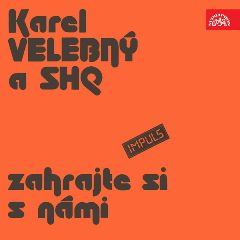Karel Velebný a SHQ - Zahrajte si s námi (1986)
Karel Velebný a SHQ - Zahrajte si s námi (1986)

1. Zahrajte si s námi. Instruktážní kazeta - ladění 00:30 2. Tony blues 04:15 3. Zase zapomněli zavřít okno 04:30 4. Trójský kůň 03:00 5. Břišní tanečnice (The Belly Dancer) 03:11 6. Karavana (Caravan) 04:02 7. OW 03:29 8. Zahrajte si s námi. Instruktážní kazeta - ladění 00:30 9. Bossa Cosa 03:42 10. Svítá 05:01 11. U dámského dvora 02:22 12. Emily 03:11 13. Nemohu začít (I Can't Get Started) 05:51 14. I. L. Y. 01:54 Karel Velebný - Vibraphone, Saxophones Emil Viklický- Piano Karel Vejvoda - Double Bass Josef Vejvoda, František Uhlíř - Drums, Percussion Jiří Stivín, Jiří Válek, Miroslav Krýsl - Saxophone Bohuslav Volf, Ivo Kopecký, Jiří Zelenka - Trombone Jaroslav Lautner, Laco Déczi, Pavel Husička - Trumpet Jiří Válek - Flute Miroslav Krýsl - Clarinet
If it were possible for painting and poetry to incorporate bebop in a crazy sort of rhythmic gymnastics, or if it were possible somehow to meld revolutionary body politic with dramatic performance then this record would be Paul Klee-meets-Bird—or, for that matter, Frank Zappa-meets-Vaclav Havel. Those expecting to hear a '60s nouvelle vague record would probably be only half right. The surprising highlight of SHQ, from Czech tenor saxophonist/bass clarinetist/vibraharpist Karel Velebny, is the exquisite poeticism that pervades throughout what is possibly one of the finest European albums that Bernard Stollman and ESP-Disk recorded in 1967.
This is music unlike anything else from those wonderful folks who also provided cinematographers Vilmos Zigmond and Laslo Kovacs, who came out west with footage of Prague Spring. Reel-to-reel. The music is poetic, combining a McLuhan-esque clash of the tactile and other sensory with the visual, hence the allusion to painter-poet Klee. But in this case it is a memorable set of music that tears up the walls between the new thing of the sixties and the bebop of Bird that much of the '60s music sought to deconstruct.
Velebny's music combines melodic invention—a result of controlled virtuosity and rhythmic creation—that came from a purely ingenious sense for time. As a tenor saxophonist, he has virtually no precedent, although there may be, at times, a hint of familiar bebop phrasing. And as a vibraharpist, he incorporates stylish, piercing jabs of mallets on ringing keys. Combined with the wild flights of creative fantasy of Jiri Stivin's alto saxophone and flute, the two develop a new kind of poetics of jazz. This is typified by a lyrical yet strident tone that echoes with luminosity long after the sound of musical notes die down. Much of Europe's response to the onslaught of jazz, during a time when it was struggling to come to terms with communism and that reactionary view of jazz, sounded that way through the '60s and '70s. What sets the music on SHQ however, is its uncommon beauty and humor. ---Raul D'Gama Rose, allaboutjazz.com
download (mp3 @320 kbs):








